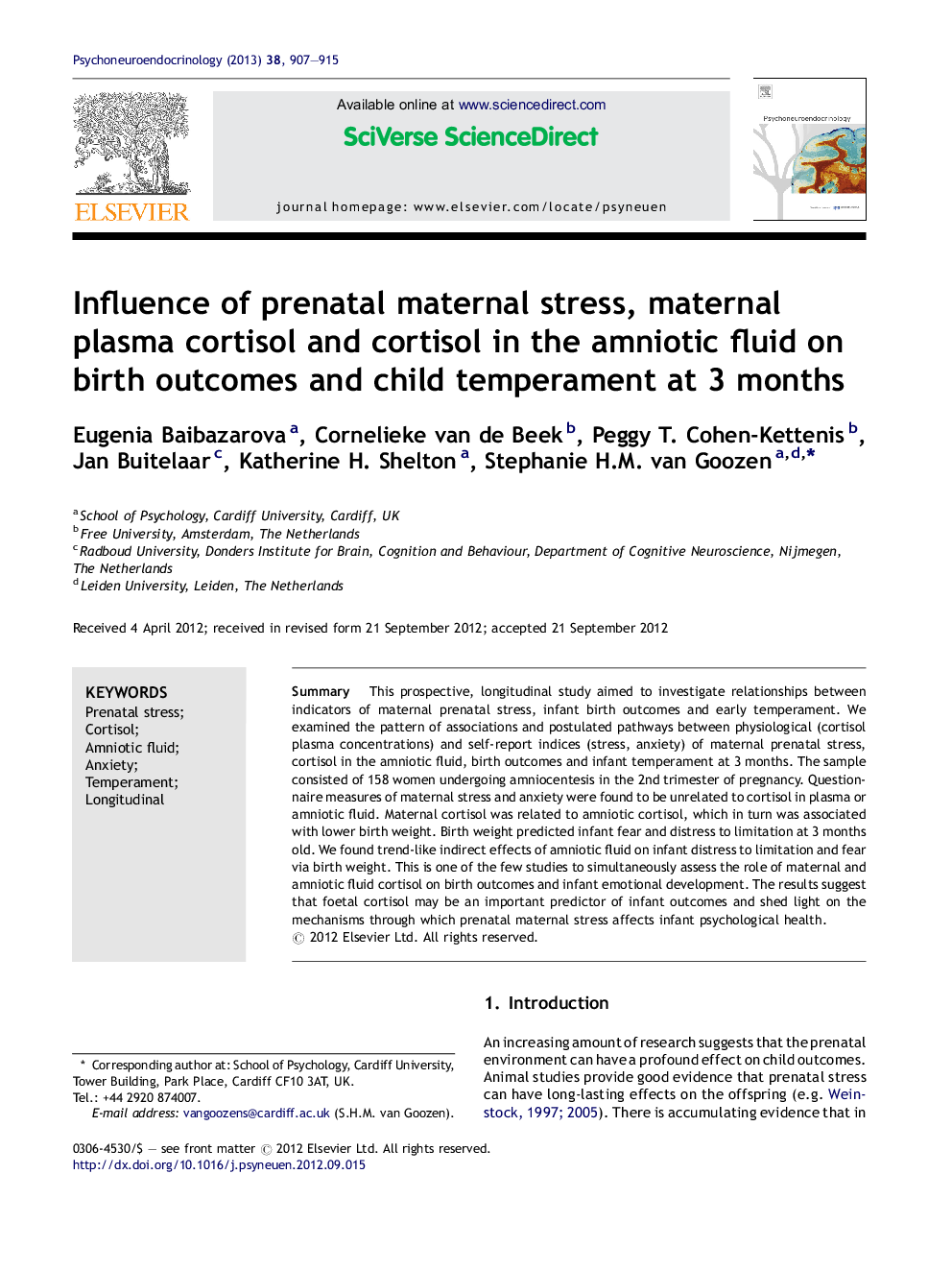| کد مقاله | کد نشریه | سال انتشار | مقاله انگلیسی | نسخه تمام متن |
|---|---|---|---|---|
| 10306244 | 547144 | 2013 | 9 صفحه PDF | دانلود رایگان |
عنوان انگلیسی مقاله ISI
Influence of prenatal maternal stress, maternal plasma cortisol and cortisol in the amniotic fluid on birth outcomes and child temperament at 3 months
ترجمه فارسی عنوان
تأثیر استرس مادران قبل از تولد، کورتیزول پلاسمای مادر و کورتیزول در مایع آمنیوتیک در نتایج تولد و خلق و خوی کودک در 3 ماه
دانلود مقاله + سفارش ترجمه
دانلود مقاله ISI انگلیسی
رایگان برای ایرانیان
کلمات کلیدی
استرس پس از زایمان، کورتیزول، مایع آمنیوتیک، اضطراب، دماسنج، طولی
ترجمه چکیده
این مطالعه آینده نگر، طولی، با هدف بررسی رابطه بین شاخص های استرس پس از زایمان مادران، پیامدهای زایمان نوزادان و خلق و خوی اولیه است. ما الگوی ارتباطات و راه های پیش بینی شده بین غلظت های فیزیولوژیک (کورتیزول پلاسمایی) و شاخص های خود گزارش (استرس، اضطراب) استرس پس از زایمان مادر، کورتیزول در مایع آمنیوتیک، پیامدهای تولد و خلق و خوی نوزاد در 3 ماه مورد بررسی قرار گرفت. نمونه آماری شامل 158 زن آمنیوسنتز در سه ماهه دوم بارداری بود. پرسشنامه سنجش استرس و اضطراب مادران با کورتیزول در مایعات پلاسما یا آمنیوتیک ارتباطی ندارد. کورتیزول مادر به کورتیزول آمنیوتیک مرتبط بود، که به نوبه خود با وزن کمتر وزن همراه بود. وزن تولد، ترس و ناراحتی نوزاد را در 3 ماهگی محدود کرد. ما اثرات غیر مستقیم اثرات مایع آمنیوتیک را بر پوسیدگی نوزادان به محدودیت و ترس از طریق وزن هنگام تولد پیدا کردیم. این یکی از مطالعات چندگانه برای به طور همزمان ارزیابی نقش کورتیزول مایع مادرزادی و مایع در نتیجه تولد و رشد عاطفی نوزاد است. نتایج نشان می دهد که کورتیزول جنینی ممکن است پیش بینی کننده مهمی از پیامدهای نوزاد باشد و بر مکانیزمی که از طریق آن تنش مادر زایمان بر روی سلامت روان کودک نوزاد تاثیر می گذارد را بروز دهد.
موضوعات مرتبط
علوم زیستی و بیوفناوری
بیوشیمی، ژنتیک و زیست شناسی مولکولی
علوم غدد
چکیده انگلیسی
This prospective, longitudinal study aimed to investigate relationships between indicators of maternal prenatal stress, infant birth outcomes and early temperament. We examined the pattern of associations and postulated pathways between physiological (cortisol plasma concentrations) and self-report indices (stress, anxiety) of maternal prenatal stress, cortisol in the amniotic fluid, birth outcomes and infant temperament at 3 months. The sample consisted of 158 women undergoing amniocentesis in the 2nd trimester of pregnancy. Questionnaire measures of maternal stress and anxiety were found to be unrelated to cortisol in plasma or amniotic fluid. Maternal cortisol was related to amniotic cortisol, which in turn was associated with lower birth weight. Birth weight predicted infant fear and distress to limitation at 3 months old. We found trend-like indirect effects of amniotic fluid on infant distress to limitation and fear via birth weight. This is one of the few studies to simultaneously assess the role of maternal and amniotic fluid cortisol on birth outcomes and infant emotional development. The results suggest that foetal cortisol may be an important predictor of infant outcomes and shed light on the mechanisms through which prenatal maternal stress affects infant psychological health.
ناشر
Database: Elsevier - ScienceDirect (ساینس دایرکت)
Journal: Psychoneuroendocrinology - Volume 38, Issue 6, June 2013, Pages 907-915
Journal: Psychoneuroendocrinology - Volume 38, Issue 6, June 2013, Pages 907-915
نویسندگان
Eugenia Baibazarova, Cornelieke van de Beek, Peggy T. Cohen-Kettenis, Jan Buitelaar, Katherine H. Shelton, Stephanie H.M. van Goozen,
